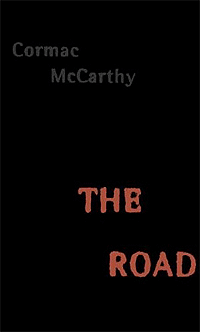
The old apothegm: bad books make good movies, good books make bad movies, is, like most backdoor commandments, there to be broken. Today’s New York Times brings a report from Charles McGrath on the making of the movie version of Cormac McCarthy’s most recent novel, The Road. I had known—as I suspect everyone can’t but know such deeply consequential things these days—that a movie was in the works, but hadn’t heard details. So now there are details, which you can peruse further, here and there.
One is saying nothing new, of course, that some books seem to succeed precisely because the reader must imaginatively complete them. Put differently, some books seem not to be able to exist if one sees them literalized. The Road would seem like one of these. In description, after all, the novel is a played-out genre exercise; in execution, though, it’s a revivifying work of art—as particular and strange as genre is generic and familiar.
Like all McCarthy’s work, The Road transcends its subject matter—its literality—not through literariness but through McCarthy’s unshakable confidence of seeing. We may read McCarthy greedily because of his style–but to say this does miss the point barely, assumes a common definition for style that we don’t all share. I wrote about this matter of style’s meaning at some length and through a seeming back door elsewhere, a piece which creeps towards a definition by Marcel Proust quoted in my previous post—that style is not surface effect, but a quality of vision that transcends effect.
It is McCarthy’s quality of vision that comes through in his writing, a quality put at risk, at times, by the quality of his vocabulary. In The Road, though, McCarthy’s knowledge of and affection for the English language is trued, as in his earliest novels, to the rigors of his subject (and, apparently, as he told Oprah, by the unaccustomed speed with which he composed the novel—a few weeks). Though no less conspicuously written (there’s the tempo-tampering grammar; the simile-studded syntax; the unpunctuated clausal flows) the language of the novel takes hold quickly, and seats the reader before a parade of views. The novel’s opening paragraph:
When he woke in the woods in the dark and the cold of the night he’d reach out to touch the child sleeping beside him. Nights dark beyond darkness and the days more gray each one than what had gone before. Like the onset of some cold glaucoma dimming away the world. His hand rose and fell softly with each precious breath. He pushed away the plastic tarpaulin and raised himself in the stinking robes and blankets and looked toward the east for any light but there was none. In the dream from which he’d wakened he had wandered in a cave where the child led him by the hand. Their light playing over the wet flowstone walls. Like pilgrims in a fable swallowed up and lost among the inward parts of some granitic beast. Deep stone flues where the water dripped and sang. Tolling in the silence the minutes of the earth and the hours and the days of it and the years without cease. Until they stood in a great stone room where lay a black and ancient lake. And on the far shore a creature that raised its dripping mouth from the rimstone pool and stared into the light with eyes dead white and sightless as the eggs of spiders. It swung its head low over the water as if to take the scent of what it could not see. Crouching there pale and naked and translucent, its alabaster bones cast up in shadow on the rocks behind it. Its bowels, its beating heart. The brain that pulsed in the dull glass bell. It swung its head from side to side and then gave out a low moan and turned and lurched away and loped soundlessly into the dark.
Here a style of writing can be understood as a style of seeing—a “cold glaucoma” is metaphorically over the eye of the world; a metaphorical beast by a pool has eyes literally “dead white”. Eyes teem, in fact, through the dark landscape of this fable about the blinding of the world, a world at which a reader is made to peer, through its language, for visions. Whatever else a film version of The Road may offer, that drama of seeing won’t—can’t—obtain. We’ll see everything.





